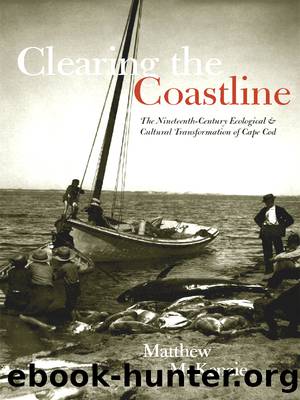Clearing the Coastline by McKenzie Matthew;

Author:McKenzie, Matthew;
Language: eng
Format: epub
Publisher: University Press of New England
The attack on pounds and weirs began in Rhode Island under the leadership of respected fishing veterans. One petition, championed by forty-six-year fisherman Nathan Smith, enlisted 170 supporters. Another longtime fisherman, Sam Brown, recruited 100 signers more for another.1 The campaignâs legal implications drew others to the anti-weir cause as well. Since its renewal in 1842, the Rhode Island state constitution guaranteed the rights of free fishing to all state citizensâa right that dated back to Rhode Islandâs original royal charter, granted by Charles II of England. As hook-and-line fishermen and their supporters read it, weirs, pounds, and traps violated individualsâ constitutional rights to free fishing by taking far more fish than an individual could with hook and line, and therefore leaving far fewer for others to catch. If the ban was approved, then new definitions of common resource use would need to be established that protected individual access to fisheries resources. There were political repercussions, too. The petitioners tied their efforts to the stateâs gubernatorial election, and in 1870, when the Republican candidate for lieutenant governor was surprisingly defeated in a typically Republican state, the message was clear: bans on pounds, traps, and weirs garnered the support of many people willing to do what was necessary to enact them.2
With strong popular support and the leverage of the election cycle, hook fishermen had little doubt that their case would prevail. To be sure, however, they kept another ace in the hole. Hook fishermen could reasonably anticipate that when their petitions were presented to the legislature, the body would investigate their claims in the same way southern New England legislatures had investigated all similar cases previously: a committee would be convened, chaired by a legislator with political ties to the issue, and would then collect testimonyâin this case from fishermenâabout the effects of stationary gear. With many hook fishermen in agreement about the effects of stationary nets on inshore stocks, much of the evidence the committee would hear would support the ban on traps, pounds, and weirs. In that case, the investigating committee would be hard-pressed not to recommend that the petition be granted.
The Rhode Island hook-and-line fishermen got most of the scenario right. Enjoying significant popular support, the legislature assembled an investigating committee in the winter of 1870. It was chaired by Newport representative Francis Brinley, who held significant ties to both hook fishermen and weir fishermen. And, as hook fishermen anticipated, Brinley turned to local residents to assess the health of the local marine environment through a series of public hearings that ran through the spring in Providence, Tiverton, Seconnet, Newport, and Narragansett Pier.
At this point, however, events failed to follow the course that hook-andline fishermen had plotted. Local hearings brought out so many heatedly opinionated and contradictory witnesses that Brinley himself conceded there was no chance he could finish the investigations as planned. âThe process of oral examination was so exceedingly slow and tedious that the committee were soon convinced of the impracticability of continuing it.â3 This should
Download
This site does not store any files on its server. We only index and link to content provided by other sites. Please contact the content providers to delete copyright contents if any and email us, we'll remove relevant links or contents immediately.
How to Do Nothing by Jenny Odell(2651)
A Forest Journey by John Perlin(2588)
The Plant Messiah by Carlos Magdalena(2458)
Babylon's Ark by Lawrence Anthony(2075)
Energy Myths and Realities by Vaclav Smil(2068)
The ESV Study Bible by Crossway Bibles(1954)
Abbey in America by Murray John A(1810)
Fatal Storm by Rob Mundle(1792)
Witness Tree by Lynda V. Mapes(1698)
Shadows on the Gulf by Rowan Jacobsen(1520)
Client Earth by James Thornton(1508)
Brokeback Mountain by Annie Proulx(1473)
Coming Back to Life by Joanna Macy(1468)
Water Rights and the Environment in the United States by John Burch(1416)
Cosmos by Carl Sagan(1405)
Ten Billion by Stephen Emmott(1385)
Mycelium Running: How Mushrooms Can Help Save the World by Paul Stamets(1290)
The overachievers by Robbins Alexandra(1287)
The Uninhabitable Earth by David Wallace-Wells;(1196)
